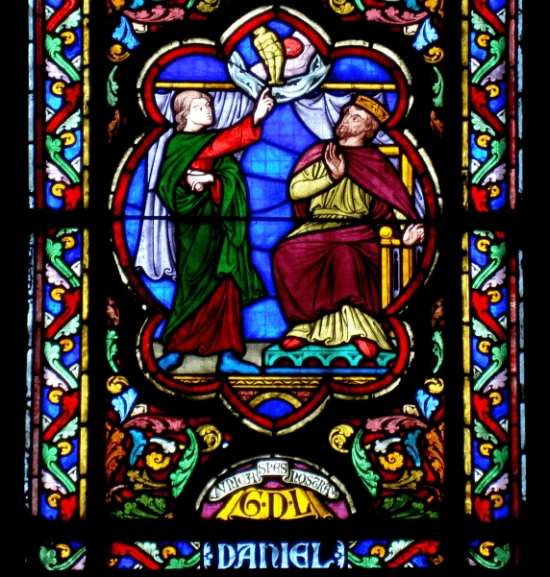1
Antraisiais Nebukadnecaro viešpatavimo metais Nebukadnecaras sapnavo sapną, kuris taip sujaudino jo dvasią, kad jis negalėjo miegoti.
2
Tuomet karalius įsakė sušaukti žynius, astrologus, burtininkus ir chaldėjus, kad jie išaiškintų karaliui jo sapną. Jie atėjo ir stojo karaliaus akivaizdoje.
3
Karalius jiems tarė: “Sapnavau sapną, kuris sujaudino mano dvasią; ir aš noriu jį žinoti”.
4
Chaldėjai atsakė karaliui: “Tegyvuoja karalius per amžius! Pasakyk sapną savo tarnams, ir mes jį išaiškinsime”.
5
Karalius kalbėjo chaldėjams: “Aš jau nusprendžiau: jei nepasakysite mano sapno ir jo neišaiškinsite, liepsiu sukapoti jus į gabalus ir paversti griuvėsiais jūsų namus.
6
Jei pasakysite sapną ir jį išaiškinsite, gausite iš manęs atpildą, dovanų ir didelę garbę! Pasakykite sapną ir jo išaiškinimą!”
7
Jie antrą kartą atsakė: “Karalius tepasako sapną savo tarnams, ir mes jį išaiškinsime!”
8
Karalius atsakė: “Aš aiškiai suprantu, kad norite laimėti laiko, nes žinote, kad aš jau nusprendžiau.
9
Jei nepasakysite sapno, nepakeisiu sprendimo. Suprantu, kad norite man duoti melagingą ir klaidingą aiškinimą, laukdami, kol laikai pasikeis. Pasakykite sapną, tada žinosiu, kad galite jį ir išaiškinti!”
10
Chaldėjai atsakė karaliui: “Nėra žemėje žmogaus, kuris galėtų įvykdyti karaliaus reikalavimą. Joks karalius, viešpats ar valdovas nėra nieko panašaus reikalavęs iš bet kokio astrologo, žynio ar chaldėjo.
11
Dalykas, kurio karalius reikalauja, yra sunkus ir nėra nė vieno, kuris galėtų jį pasakyti karaliui. Tik dievai tą gali padaryti, bet jie negyvena tarp žmonių”.
12
Karalius labai užsirūstino dėl to ir įsakė sunaikinti visus Babilono išminčius.
13
Kai karalius įsakė išžudyti išminčius, jie ieškojo nužudyti Danielių bei jo draugus.
14
Tada Danielius išmintingai ir atsargiai kreipėsi į Arjochą, karaliaus sargybos viršininką, kuriam buvo pavesta išžudyti išminčius Babilone.
15
Jis kreipėsi į Arjochą: “Kodėl toks griežtas karaliaus potvarkis?” Arjochas paaiškino Danieliui.
16
Tuomet Danielius įėjo ir prašė karaliaus laiko, kad galėtų jam jo sapną išaiškinti.
17
Sugrįžęs į savo namus, Danielius pranešė visa tai savo draugams Hananijai, Mišaeliui ir Azarijai,
18
kad jie prašytų dangaus Dievo pasigailėjimo dėl šitos paslapties, kad Danielius ir jo draugai nepražūtų su kitais Babilono išminčiais.
19
Danieliui nakties regėjime buvo apreikšta paslaptis. Tada jis šlovino dangaus Dievą, tardamas:
20
“Palaimintas Dievo vardas per amžių amžius, nes Jam priklauso išmintis ir galia!
21
Jis pakeičia laikus ir metus, pašalina ir įstato karalius, teikia išminties ir supratimo.
22
Jis apreiškia gilybes ir paslaptis, žino, kas yra tamsoje, ir šviesa yra aplinkui Jį.
23
Mano tėvų Dieve, giriu Tave ir dėkoju Tau, nes suteikei man stiprybės ir išminties ir dabar apreiškei, ko prašėmeatidengei karaliaus paslaptį”.
24
Po to Danielius nuėjo pas Arjochą, kuriam karalius buvo pavedęs išžudyti Babilono išminčius, ir jam tarė: “Nežudyk Babilono išminčių! Vesk mane pas karalių, aš pasakysiu jam išaiškinimą”.
25
Arjochas skubiai nuvedė Danielių pas karalių ir jam pranešė: “
adau vyrą iš Judo tremtinių, kuris gali pasakyti karaliui išaiškinimą”.
26
Karalius tarė Danieliui, kurio vardas buvo Beltšacaras: “Ar tu gali pasakyti, ką sapnavau, ir tą sapną man išaiškinti?”
27
Danielius atsakė karaliui: “Išminčiai, žyniai, ženklų aiškintojai ir astrologai negali atskleisti karaliui paslapties, kurią karalius siekia sužinoti.
28
Tačiau danguje yra Dievas, kuris apreiškia paslaptis ir šiuo sapnu praneša karaliui Nabuchodonosarui, kas įvyks paskutinėmis dienomis. Tavo sapnas ir regėjimai buvo tokie:
29
tu, karaliau, gulėdamas lovoje galvojai, kas įvyks po to, o Tas, kuris atskleidžia paslaptis, parodė tau, kas įvyks.
30
Man šita paslaptis apreikšta ne todėl, kad esu už kitus išminčius pranašesnis, bet kad sapno išaiškinimas būtų žinomas tau, karaliau, ir tu pažintum savo širdies mintis.
31
Tu, karaliau, regėjai didelę statulą; jos spindesys buvo nepaprastas, ji stovėjo prieš tave, jos išvaizda buvo baisi.
32
Statulos galva buvo iš gryno aukso, krūtinė ir rankosiš sidabro, juosmuo ir strėnosiš vario,
33
blauzdosiš geležies, kojosiš geležies ir iš molio.
34
Tau bežiūrint į ją, atlūžęs be žmogaus rankų pagalbos akmuo smogė į statulos kojas ir sutrupino jas.
35
Subyrėjo geležis, molis, varis, sidabras ir auksasviskas tapo lyg pelai klojime rudenį. Juos išnešiojo vėjas, nepalikęs jokio pėdsako. O akmuo, kuris smogė į statulą, tapo dideliu kalnu ir pripildė visą žemę.
36
Toks buvo sapnas. Dabar išaiškinsiu jį karaliui.
37
Tu, karaliau, esi karalių karalius, nes dangaus Dievas suteikė tau karalystę, galybę bei garbę.
38
Visur gyvenančius žmones, laukinius žvėris ir padangės paukščius atidavė į tavo rankas ir padarė tave visa ko valdovu. Tu esi auksinė galva.
39
Po tavęs iškils kita karalystė, silpnesnė už tavo; trečioji karalystė, varinė, viešpataus visai žemei.
40
Ketvirtoji karalystė bus stipri kaip geležis. Kaip geležis sudaužo ir sutrupina viską, taip ši karalystė sutrupins visas kitas.
41
Kaip sapne regėjai, kad statulos kojos ir jų pirštai buvo dalinai iš molio ir dalinai iš geležies, taip ketvirtoji karalystė bus pasidalinusi, tačiau geležies stiprumo bus joje, nes tu matei geležį, sumaišytą su moliu.
42
Kadangi kojų pirštai buvo iš geležies ir molio, tai karalystė bus dalinai stipri ir dalinai trapi.
43
O kadangi regėjai geležį, maišytą su moliu, tai reiškia, kad jie susimaišys per žmogaus sėklą, tačiau nesusijungs, kaip geležis nesusijungia su moliu.
44
Tų karalių dienomis dangaus Dievas įsteigs karalystę, kuri niekada nebus sunaikinta, kuri neatiteks jokiai kitai tautai. Ji sunaikins ir sudaužys visas karalystes ir pati pasiliks per amžius,
45
kaip tu matei nuo kalno be žmogaus rankos pagalbos atlūžusį akmenį, kuris sutrupino geležį, varį, molį, sidabrą ir auksą. Didysis Dievas parodė tau, karaliau, kas bus ateityje. Sapnas yra tikras ir jo aiškinimas teisingas”.
46
Tada karalius Nebukadnecaras parpuolė veidu į žemę, pagarbino Danielių ir įsakė aukas bei smilkalus jam aukoti.
47
Karalius Danieliui tarė: “Iš tikrųjų jūsų Dievas yra dievų Dievas, karalių Viešpats ir paslapčių atskleidėjas, nes tu sugebėjai atskleisti šią paslaptį!”
48
Tada karalius išaukštino Danielių, davė jam daug brangių dovanų ir paskyrė jį Babilono srities valdovu ir visų Babilono išminčių vyriausiuoju valdytoju.
49
Danieliaus prašomas, karalius paskyrė Šadrachą, Mešachą ir Abed Negą reikalų tvarkytojais Babilono sričiai, o Danielius pasiliko karaliaus rūmuose.







